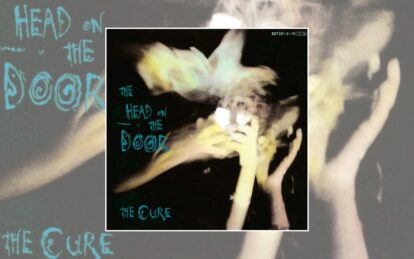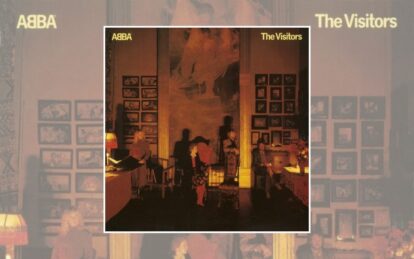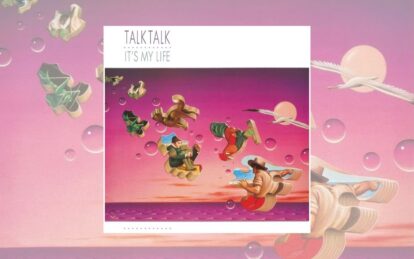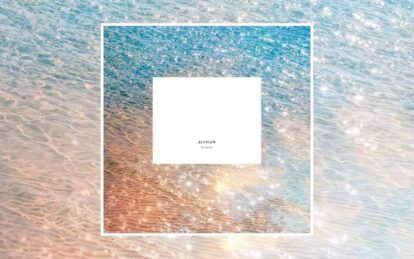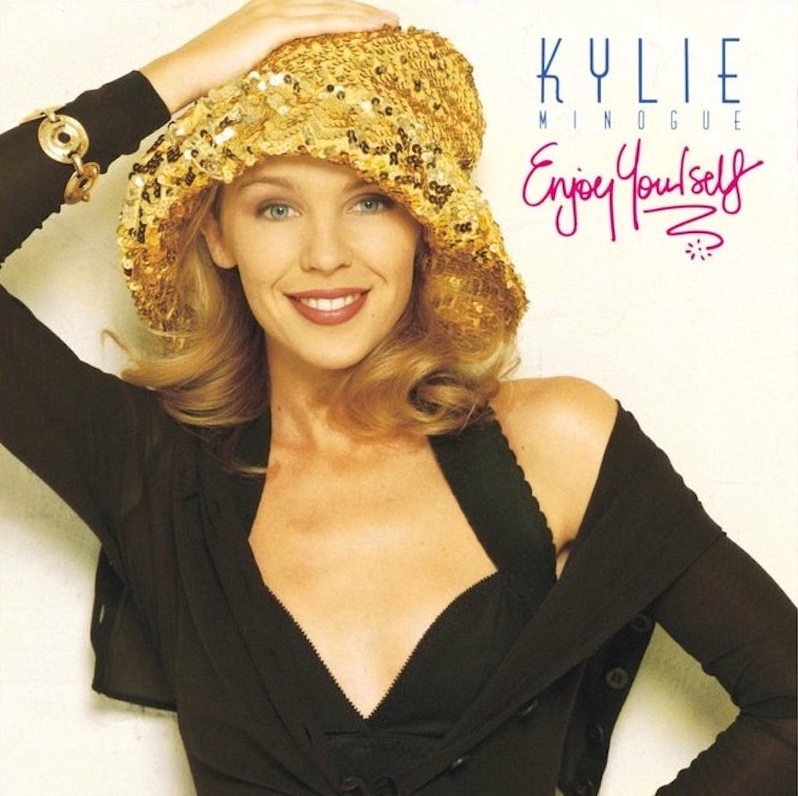
The second album from Kylie Minogue, Enjoy Yourself, may have been a magnet for critical sneers, but written solely with the fans in mind, it still sold by the truckload…
Critics weren’t kind to Enjoy Yourself when it landed on record shelves on 9 October 1989. It was, according to People magazine, “another Charlene album” and to Rolling Stone it was simply “inept”.
But reviews didn’t matter to Stock Aitken Waterman – they were long used to being the music press’ whipping boys.
Their music was critic-proof, as witnessed by the fact that Kylie’s second album debuted at UK No.1 with pre-sales of over 600,000, becoming the sixth best-selling LP of 1989. Who cared what those dinosaurs at Rolling Stone thought?
Enjoy Yourself arrived 14 months after Kylie’s self-titled debut. That album had been the UK’s biggest-selling record in 1988, gone Top 10 in eight countries and had been certified four times platinum by the Australian Recording Industry Association. So, no pressure then.
With that LP a headline-making success and her pop career taking up more and more of her time, Kylie decided to exit Neighbours in July 1988 and that November recorded Especially For You, a surefire hit as it finally teamed that show’s Scott and Charlene on vinyl.
It was in February 1989 when Kylie reunited with Mike Stock, Matt Aitken and Pete Waterman at PWL Studios
1 and 4 in London.
“We aren’t nervous about following up the first album at all, we were on a treadmill and loving it,” Waterman is quoted as saying in Matthew Lindsay’s book The Hitmen & Her.
There was a break in recording in May to allow Kylie to fly to Australia to film her debut movie, The Delinquents, a 1950s-set coming of age drama.
The shoot lasted two months, after which Kylie jetted back to the UK to resume work on what would eventually be titled Enjoy Yourself.
While critics at the sniffier end of the spectrum lambasted the record for being more of the same, in fact, there’s a lot of variety on Kylie’s follow-up.
“There are a lot of different songs,” Kylie reflected in 1990. “Enjoy Yourself has balance and a sort of 50s orchestra number… I think it has a wider range of appeal [than Kylie].”
Not all agree, however. Sean Smith, who wrote 2006’s Kylie: The Biography, says: “[Enjoy Yourself] was little more than an extension of her debut album, an example of not fixing something when it isn’t broken.”
SAW get a particularly raw deal from many music journos. But there’s a reason why they were nicknamed the Hit Factory in the late 80s.
Few producers could guarantee their artist a hit, but Stock Aitken Waterman could. They knew the winning formula and stuck loyally to it.
“We have taken pop music back to the people,” Waterman told the Gay Times in 1990. “Back to the people who buy records, not the journalists who preach to people.”
Few producers have such an immediately identifiable sound as Stock Aitken Waterman. Their high-production gloss and instantly relatable lyrics (they weren’t out to change the world, just give love-struck teens something to dance or cry to) made them the Motown of their era.
These were records that made an instantaneous emotional connection to their listener – just look at the sheer amount of PWL songs that have ‘heart’ in their title: Jason Donovan’s Too Many Broken Hearts, Rick Astley’s Take Me To Your Heart, Sinitta’s Cross My Broken Heart, Dead Or Alive’s My Heart Goes Bang, Sonia’s Listen To Your Heart and, of course, Enjoy Yourself’s Hand On Your Heart and My Secret Heart.
There are elements of bubblegum, R&B, synth-pop, dance and disco in the aptly-titled Enjoy Yourself. Unlike Kylie, which had been entirely penned by Stock Aitken Waterman, there was one cover version here, the 1950s standard Tears On My Pillow, made famous by Little Anthony And The Imperials.
The song had been earmarked for the Delinquents soundtrack, with Waterman giving Kylie a choice of that track or Frankie Lymon and The Teenagers’ 1956 hit I’m Not A Juvenile Delinquent.
The album’s sleeve, depicting a smiling (of course) Kylie holding a golden glitter hat to her head, was shot by British photographer Simon Fowler, with the singer telling BBC TV’s The Clothes Show that she found the cover photo “quite daring” and that it “does reveal a bit of flesh”.
“[The hat] is from London,” she said. “I’m heavily into sequins at the moment. I don’t think I would wear it down the street though.”
The first preview of Kylie’s much anticipated sophomore album came in April with the release of Hand On Your Heart, followed two months later by Wouldn’t Change A Thing. The LP itself dropped on 9 October (though not in Australia, where it was released via Mushroom Records on 6 November).
PWL spent £250,000 on the advertising campaign for the album, and the same month Kylie embarked on her first tour. Disco In Dream wasn’t a Kylie-only showcase though, instead it was intended as a spotlight for various SAW acts, including Sinitta and Dead Or Alive.
The tour opened in Asia, later travelling to Europe as The Coca-Cola Hitman Roadshow with a different lineup of SAW artists such as Big Fun and Sonia.
Though Kylie gifted fans a selection of songs from both Kylie and Enjoy Yourself, it wasn’t until 1990’s Enjoy Yourself tour (which ran between February to May) that she really got to dig deep into those albums.
The tour kicked off in Australia before heading to the UK and finishing with two dates in the Far East. Her performance in Birmingham, the first city of the European leg, attracted 12,700 fans.
While some publications dug Enjoy Yourself (Number One magazine praised it), most were nonplussed by this latest collection of Hit Factory tunes.
More recent retrospectives have been kinder, however. AllMusic’s Chris True found the album was an impressive follow-up to her debut, and wrote that SAW “knew what they had and they crafted songs that kept [Kylie] in the public eye.”
In The Encyclopedia Of Popular Music (2011), writer Colin Larkin gives Enjoy Yourself three out of five stars, calling it “highly listenable”.
Nick Levine from Digital Spy, similarly awarded it three stars, writing: “It’s got a bit more variety than her debut, but one or two fewer strong tunes – and consequently a touch less charm.
“Still, if you’re fond of the singles and Minogue at her most ingenuous, you’ll find that Enjoy Yourself makes good on the promise of its title.”
Like its predecessor, Enjoy Yourself debuted on the UK Albums Chart at No.1, and reached double platinum status, selling over one million copies in its first 10 weeks of release.
The album reached the top in Hong Kong and Ireland, and the Top 10 in Belgium, Denmark, Greece and Japan.
For all the success, however, it was becoming clear that Kylie was beginning to feel trapped within the Stock Aitken Waterman machine.
“I was longing for choice,” she says in the book Kylie La La La, “and there wasn’t really a part in the Hit Factory’s ethos for this. Out of the studio and confines of PWL, I started to experiment where I could: with image.
“I wanted to develop, to experience different things and express myself beyond primary colours and a shallow set of TV answers. I was bound to and did make mistakes, but I believe that if you don’t allow yourself to make mistakes then you’re not making much. I was 21 and I was growing up. My own sexual revolution…”
Enjoy Yourself rarely features high in the lists of the top Kylie albums. It’s no Fever or Impossible Princess. But to a generation that discovered Kylie through I Should Be So Lucky and Neighbours, it’s a treasurable record, full of bright, honeyed, teen-targeted pop.
It’s very easy to sneer at those early Kylie albums, but 34 years on from its release, Enjoy Yourself still sounds as fresh and effervescent as it did back in 1989.
Kylie Minogue: Enjoy Yourself – the songs
Hand On Your Heart
Enjoy Yourself’s lead single is sung from the viewpoint of a girl whose boyfriend is trying to break up with her, except she still believes there’s a future there (“Put your hand on your heart and tell me that we’re through”). It became Kylie’s third song to debut at No.2, before moving up to No.1 the next week.
Wouldn’t Change A Thing
Second single Wouldn’t Change A Thing just missed the top spot in the UK, peaking at No.2 in the summer of ‘89 (damn you, Jive Bunny And The Mastermixers’ Swing The Mood). Bill Coleman from Billboard described the song as “a delicate dance/pop ditty”, adding, “Take note of the pumpin’ 12” mixes.”
Never Too Late
Track three and the album’s third single was composed, Mike Stock revealed on the A Journey Through Stock Aitken Waterman podcast, with deliberately “old-fashioned” lyrical themes, imagining it in the style of a 1920s number. The song debuted at No.17 in the UK and rose to its peak of No.4 the following week.
Nothing To Lose
This ‘should have been a single’ track is SAW at their bubbliest and most infectious, with Kylie telling us, “Gotta take a chance, gotta make a move/ Got everything to gain and nothing to lose/ Ah, nothing to lose/ Everything to gain and nothing to lose.”
Tell Tale Signs
The album’s first sonic surprise, a 40s-styled jazz-oriented and string-laden torch song, in which Kylie acknowledges that a relationship is falling apart. A massive departure for Kylie, and at two minutes 25 seconds it doesn’t outstay its welcome. (Should have been a Christmas single, we think.)
My Secret Heart
Though it’s one of the album’s showiest songs, My Secret Heart is, like Tell Tale Signs, far from the Stock Aitken Waterman template. This is one of those tracks to play to someone if they’re going on a SAW “production line blah blah blah” rant as an example of how they often had the ability to surprise.
I’m Over Dreaming (Over You)
We’re back to thumping 80s pop with this one, though the lyrics haven’t aged well, depicting its singer as the hopelessly needy one in the relationship – “But why am I waiting for you/ When you treat me like you do”. If you ignore the simpering words, this is a banger, and was doubtless spun in quite a few nightclubs in ‘89.
Tears On My Pillow
Recorded for the Delinquents soundtrack, this version of the 1958 standard showed that Kylie had a voice that could bring even 30-year-old covers to life. The song reached No.1 on the UK Singles Chart for one week in January 1990. It’s worth checking out the 7”, if only for its sublime B-side, We Know The Meaning Of Love.
Heaven And Earth
Another song about a failing relationship, though this one at least has its singer not clinging on to a fantasy: “I don’t really want to be the one/ To tell you time is running out/ Because it’s obvious.”
Enjoy Yourself
It’s back to the dancefloor for the final number, which boasts some of SAW’s most trite lyrics (“Never let life get you down”, “Take your chances while you can”, “Don’t wait ’til tomorrow when you should be living for today”, “Nothing comes to those who will not try” etc). But hey, you don’t come to Stock Aitken and Waterman for Pulitzer Prize-winning poetry, do you?
- Want more from Classic Pop magazine? Get a free digital issue when you sign up to our newsletter!
Classic Pop may earn commission from the links on this page, but we only feature products we think you will enjoy.


